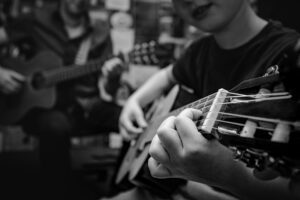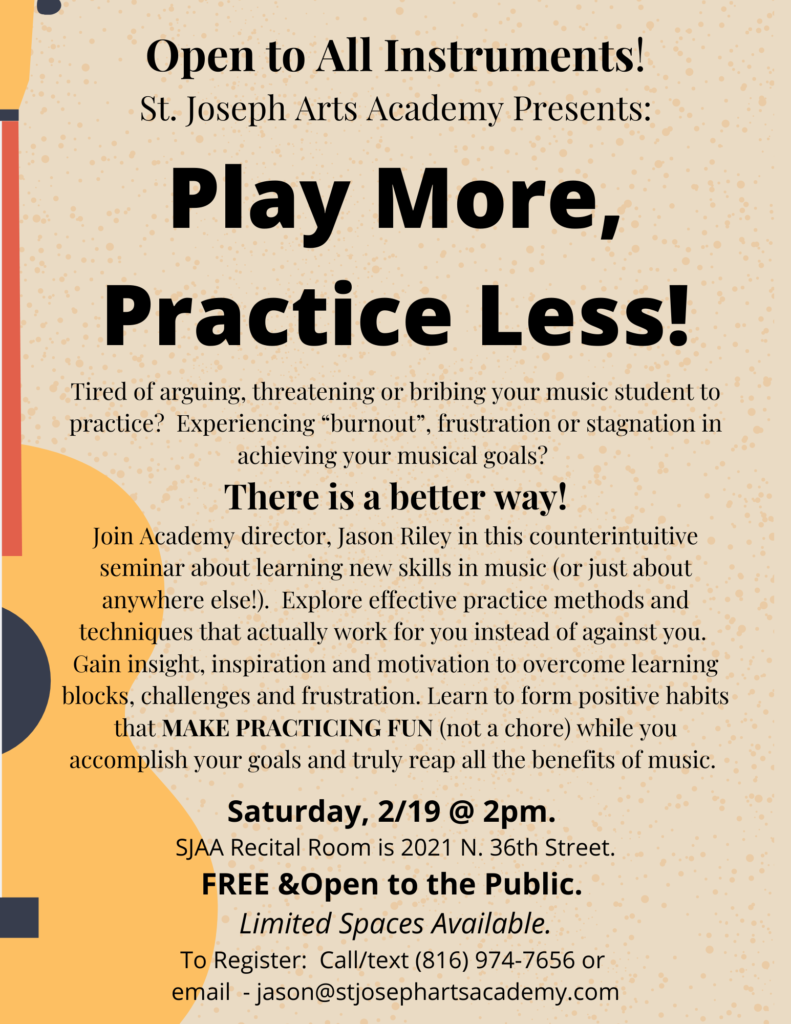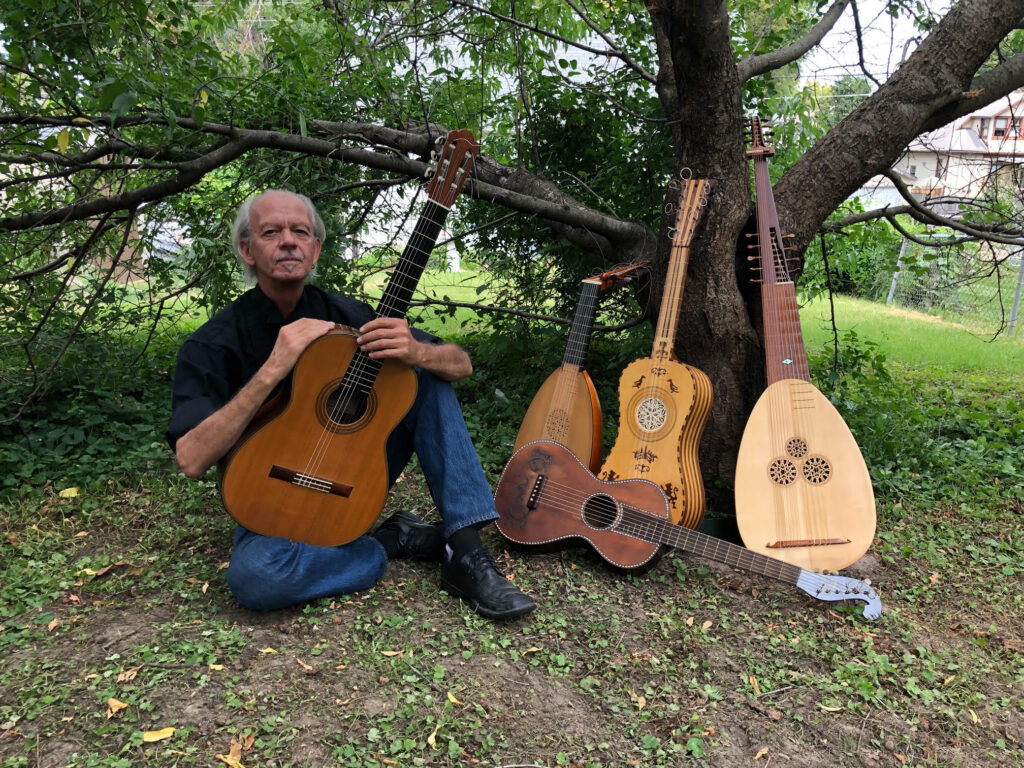|
||||||||||||||||||||||||||||||||||
|
||||||||||||||||||||||||||||||||||
|
||||||||||||||||||||||||||||||||||
|
||||||||||||||||||||||||||||||||||
|
Category: Music Lessons
Uke-Box Hero! – Intro to Ukulele Class
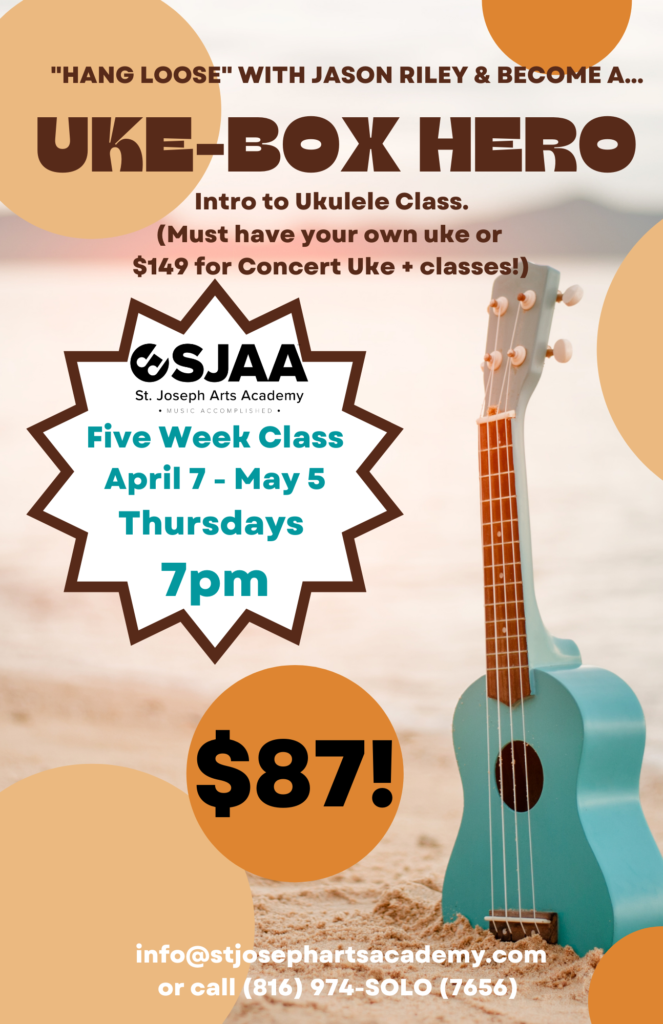
Who’s Ready to Learn a Fun New Instrument?! “Uke Box Hero” Intro to Ukulele Class. Join Academy director, Jason Riley for this fabulous intro into playing the Ukulele! 5 weekly, 50min sessions on Thursday evenings at 6 beginning 4/7 – 5/5. Learn the chords, strumming, picking and reading techniques needed to play literally 100’s of familiar songs.
Ages 8-Adult. Must have your own guitar/uke (or inquire about a rental/purchase).
Registration Deadline is 4/5.
Limited spaces available.
Call/text (816) 974-7656 or email jason@stjosephartsacademy.com to register or for more info.
Title: “Uke Box Hero” Intro to Ukulele Class
Instructor: Jason Riley
Date(s): 4/7 – 5/5
Time: 7-7:50pm
Fee: $87 ($149 includes concert uke)
Registration Deadline: 4/5
How to Register: (Limited Spaces Available)
– Call/Text (816) 974-7656
- Email jason@stjosephartsacademy.com
- Facebook Messenger @stjosephartsacademy
- www.stjosephartsacademy.com/request-info
How to Practice
How To Practice
One definition of practice is… “a repeated exercise or performance of an activity or skill so as to acquire or maintain proficiency in it” As in it must have taken a lot of PRACTICE to be such a good guitar player.
Doctors and lawyers are said to have a practice when carrying out the exercises and duties of their profession. I don’t really want my doctor to be PRACTICING on me as he’s cutting me open. I want him to PERFORM the perfect operation.
Practice can also be customary, habitual or expected procedures for something. This could be like a meditation practice or yoga.
As musicians, we really embody each of these definitions of practice in slightly different mindsets. The exercises needed to perform a technically challenging passage or even to get our muscle-memory together enough to play a basic chord and then a chord progression. Music is also our field of study as in medicine or law, it IS our practice. Hopefully it is also a thing that we’ve made a part of our day to day programming that happens habitually. We don’t necessarily call it practice but I hope you’re planning to eat, sleep and brush your teeth today.
So what are things we should do to become a person of practice and what does it mean to practice well? What does effective practice look like? When are we done practicing?
It actually took me many years to discover and refine my techniques for effective practicing. I’ve tried a number of approaches that I may touch on here. My way doesn’t have to be your way. You should definitely explore what best practices are for yourself.
At its most basic, practice is time set aside to do your best. There can be many things that can distract us from the task at hand or take our mind away from our most challenging work.
Perhaps you’ve had the experience of sitting down to practice a new piece and after a few minutes you’re noodling away on favorite licks, riffs or another piece entirely (usually all things you already play pretty well). You might even become so mesmerized in this that you actually lose track of time, not realizing that you’ve been just “playing” with your instrument for 20 minutes. Weren’t you supposed to be “practicing”? It’s ok to make some time just to noodle, jam or play for fun. Set your timer though and get back to work after that time is spent.
To be truly successful in your practicing you need to have a purpose or goal and be on a time schedule. We all have the feeling that we want to become “a better guitarist” but that is not what I mean by purpose. The purpose of your practice should be topical (learn a new scale fingering, accompaniment style or arrangement) and should be scheduled for a certain amount of time.
My personal practice usually involves a few topics. These are places in my playing where I’m trying to “grow”. I use many of these same areas and methods with all my students no matter the age or level of achievement. Topics include things like technique, scale and chord vocabulary, sight reading, pieces/songs/tunes, ear-training and memorization. There are many more I have included over the years again depending on what my purpose was at the time or where I felt I had some weaknesses. Theory, performance practices, history, improvisation and just time to listen to music are all things I’ve put time into. I want to grow in all these areas in deeper ways.
So let’s make some time to practice. Put it in your schedule. Write it on the calendar. A little time everyday. The famous Japanese music mentor, Shinichi Suzuki said you should only practice the “days you sleep and the days you eat”! I think that’s great advice. We all will miss a day now and again and that’s understood. You may want to set your weekly practice schedule up to include a “skip day”. That’s an important “practice” in some religious circles. Also, it can be a nice reward especially for younger students who really work hard all week.
The amount of time each day is not as important to me as just the “every day”. If you practice with a purpose everyday you will get better. A lot has been said in the past few years that it takes 10,000 hours to become a master at anything. Free-throws, heart surgery, flower arranging, etc. You’ll be come the “master” faster by practicing 3 hours everyday as opposed to 10 minutes obviously. Mastery is the fruit of purposeful practice. No need to worry about the fruit. It will come at the right time and in the right season. Your practice is in taking care of the tree. Prune it and water it with the time you have today and schedule it again tomorrow. Do that and you’re doing the best you can.
10 hours a day for 3 years = Your the master!
3 hours a day for 10 years = Your the master!
1 hours a day for 30 years = Your the master!
I will say that in my experience it takes at least 20 minutes of practice just to kind of stay at the place you left off yesterday. If you don’t use it (and use it again) you’ll lose it.
I use the timer in my practice (and a tuner, a metronome, books and music, a music stand, and a pencil but the timer is VERY important). It keeps you on task. If you are playing a game like basketball, that game is timed. You have a certain amount of time to play with a purpose of making points for your team, defending against the opposing team and doing your very best. Then there’s a buzzer that signals the end of play, maybe the 1/2, the 1/4 or the end of the game. The point here is that you did your very best, you kept your head in the game and now it’s over.
My music practice is very much like that. I start the time and work on an a-lotted task for a certain amount of time. This is usually very short, between 2-20 minutes per task. This has two benefits. One, I know that I have to do my best for a very short time. Not hammering away for hours, just minutes. Two, if I do get distracted or get off task and do some mindless noodling, it reminds me to come back to the project and work until the buzzer goes off. With my students, I even give them pretend “points” for perfect repetition of the material. One perfectly played scale = 10 points or 100 or whatever. They may have only 3 minutes to make as many points as possible. It’s a little mind game but it works really well, gets them to do their best and make a many perfect reps as the time allows.
Again, there are number of important topics that go into building musical proficiency. You might just pick a few each day to devote your time to. When that buzzer goes off or time is up, move on to the next topic and start the timer again. Depending on the amount of time you’ve set aside for practice, you could do more or less. Remember, less in more in many instances.
As an example, If we had an hour to practice, I would start with a slow warm-up for maybe 10 minutes. We could move on to scales for 10, Chords for 10, sight reading for 10 and maybe one piece we’re working on for 10 minutes. It wouldn’t have to be the entire piece, lots of times its just a few measures or specific trouble areas. Then you could take a little break. Lots of performing musicians take set breaks too!
If that was all the time you had for the day, you could be done and go on with your life. If you had additional time (perhaps another hour) I would start with that routine again and repeat it. If you have less time maybe on a very busy day, you could get a 10 minute practice in on just two or three really important ideas at 3-5 minutes each. Hey, we can all find 10 minutes even on a busy day, right? The important thing is that you’re doing it on purpose and you’re proving to yourself that you’re disciplined, dedicated and committed to your advancing musicianship.
If you’re making a lot of mistakes while practicing, you are probably going too fast or trying to practice too much. This is a common problem and it does take a lot of discipline to slow down and work on very small or short musical problems.
Truly effective practice is practice with a purpose. That purpose is different for everyone and adjusted to the topic you’re working on. You might have a goal to play a C major scale in 1/8th notes at 160bpm. You might want to learn a new jazz standard every week. You may need work on that one measure that always messes you up in that Bach prelude. Your purpose is to fix, add or increase in your abilities as they apply to your goals in music.
Here’s a few other ideas about what practice is and what it can do for you.
Practice is..
Motivational – The more you do it, the more you want to.
How we learn – Things seep in over time through repetition. We learn by doing.
Transformative – Makes things better through attention and intention.
Reducing Imperfection – Unlearning bad habits or replacing them with good habits.
The way to Carnegie Hall – “How do you get to Carnegie Hall? Practice.”
Infectious – A little can lead to a lot.
Love – It demonstrates your affection for what you are practicing.
To Overcome – Limitations and small expectations.
Making Mastery – 10,000 hours.
Confidence building – When you’ve put in the time to know what you’re doing and you know it.
Non-judgmental? – Do it when you feel good or bad. When it’s time to fight, you have to do it no matter what mood you’re in.
Persistence – No matter what happens, just keep plowing ahead.
What you become – Like the doctor or lawyer, you are what you practice most.
Life Enhancing – Just do it, you’ll be glad you did.
A Teacher – It encourages us on the path of discovery. It shows you what it and what it might become.
Truth – It’s where you find out what’s real for you. Where you are on the path.
Application – Using what you know, at the right time, when you need it.
For Champions and Masters – They all did it. I promise.
Not Easy – It feels like work sometimes, ok all the time.
Acceptance – Forgive yourself for not being automatically perfect. You’re getting closer.
Purposeful – Practice with a purpose in mind. Practice because you’ve got to. it’s the only way.
Cultivating – The tree that your fruit comes from.
An Inner Game – The only competition is within. The only real competition is in the mirror.
Tomorrow’s Victory – “Tomorrow’s victory is today’s practice – Chris Bradford, The Way of the Warrior.
Development – The garden grows best when it’s weeded and tended to. True in all things like love, forgiveness, patience and giving.
Preparation – To being and doing what you want to be and do.
Practice is… THE WAY.
Practice Makes Perfect?
Practice Makes Permanent
Practice Makes Possible
Practice Makes Possibilities
Practice Makes Patience
Practice Makes Partnerships
Practice Makes Playing Possible
Practice Makes Pathways
Practice Makes Progress
Practice Makes Proficient
Practice Makes Professional
Practice Makes Proof
Practice Makes Practical
Practice Makes Precedence
Practice Makes Prepared
Practice Makes Purpose
Practice Makes Perception
Practice Makes Performers
Summary – Whatever you can imagine or aspire to do, you can do that in music (or anything almost) through focused practice over time. I aspired to play music. I’ve never really felt that I had any great or natural talent to do so. Everything that I’ve accomplished in music and on my instrument has just been through hard work, smart work, time and persistence. In short, practice.
While I may never be a ballet dancer or professional football player because of my physical build (not that I’m inspired to become one). Through practice and study, I could learn the techniques, I could get better, I would grow.
It’s truly amazing what human beings can accomplish given enough time.
Special Offer – If you found this article helpful, please consider subscribing, drop us a note or consider joining us on the path to mastery. The St. Joseph Arts Academy is a resource for all things musical. We are here to support and encourage you along your musical path. Now…
GO PRACTICE!
“How to Practice”
By Jason Riley
https://www.stjosephartsacademy.com
Looking for great Live music or a Live band for your event?
Free Music Practice Clinic
Open to All Instruments!
St. Joseph Arts Academy Presents
Play More, Practice Less!
Tired of arguing, threatening or bribing your music student to practice? Experiencing “burnout”, frustration or stagnation in achieving your musical goals?
There is a better way!
Join Academy director, Jason Riley in this counterintuitive seminar about learning new skills in music (or just about anywhere else!). Explore effective practice methods and techniques that actually work for you instead of against you.
Gain insight, inspiration and motivation to overcome learning blocks, challenges and frustration. Learn to form positive habits that MAKE PRACTICING FUN (not a chore) while you accomplish your goals and truly reap all the benefits of music.
Saturday, 2/19 @ 2pm.
SJAA Recital Room is 2021 N. 36th Street.
FREE & Open to the Public.
Limited Spaces Available.
To Register: Call/text (816) 974-7656 or
email – jason@stjosephartsacademy.com
https://www.stjosephartsacademy.com
Looking for great Live music or a Live band for your event?
The Write Notes – October/November (Double Issue)
|
||||||||||||||||||||||||||||||||||||
|
||||||||||||||||||||||||||||||||||||
|
||||||||||||||||||||||||||||||||||||
|
The Write Notes – August 2021
|
||||||||||||||||||||||||||||||||||||
|
||||||||||||||||||||||||||||||||||||
|
||||||||||||||||||||||||||||||||||||
|
Maestro Series 2021 – Anthony Glise
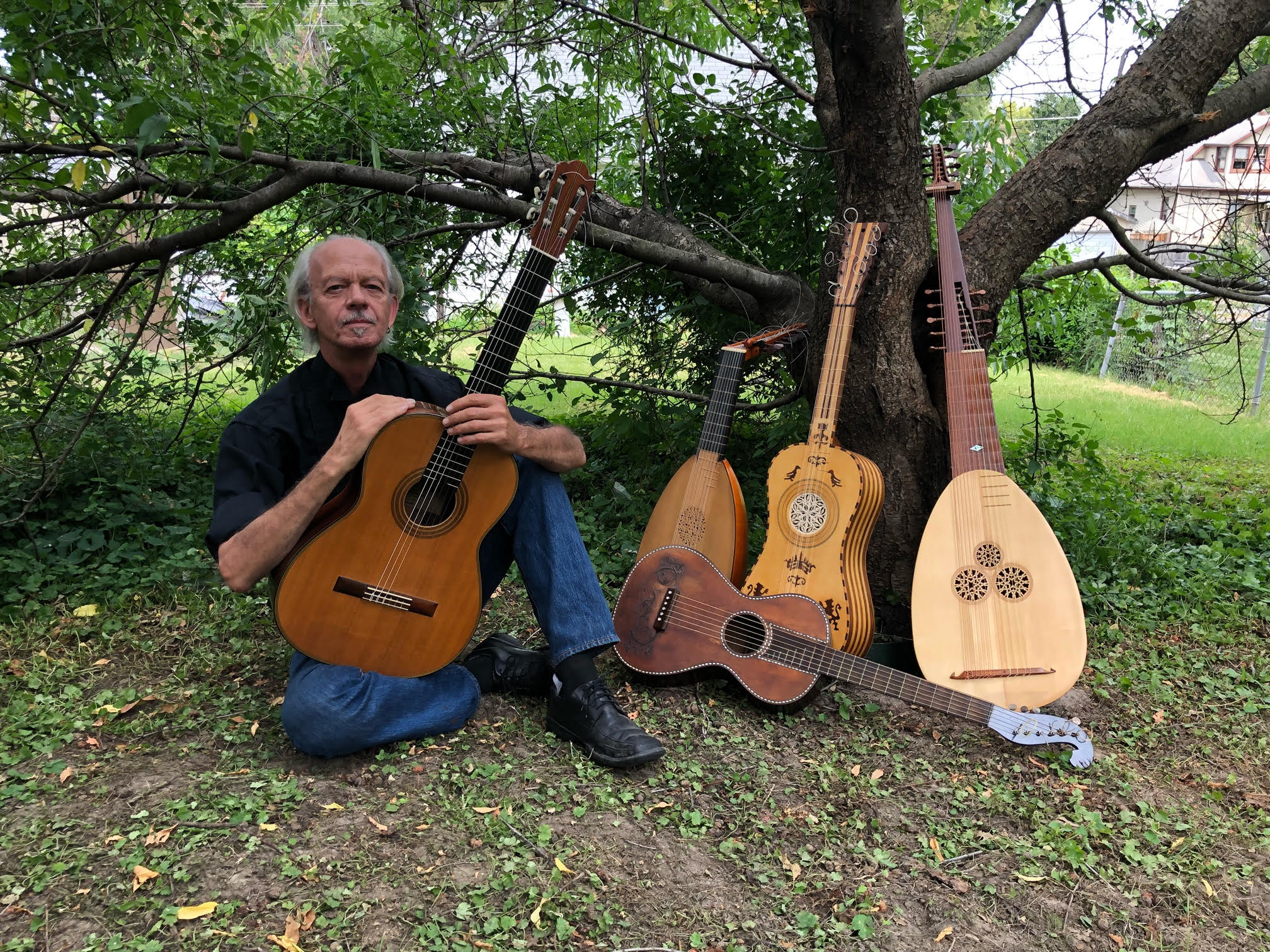
Saturday, August 14, from 2:00-4:00 PM
St. Joseph Arts Academy
2027 N. 36th St.,
St. Joseph, Missouri
—————————
The St. Joseph Arts Academy in association with the St. Joseph Music Foundation will present an “informance” (a combination of lecture and performance) and a masterclass by internationally acclaimed classical guitarist, Anthony Glise as part of the Academy’s “Maestro Series.”
Targeted to all age groups including non-musicians, Glise will discuss the history of the guitar from 1400 to today and perform on various historical instruments from his private collection, including a Renaissance lute, Baroque guitar, 18th-century archlute, 19th-century guitar, and the modern guitar.
The informance is based on Glise’s university textbook, “The Guitar in History and Performance Practice” which is used in hundreds of universities worldwide.
For the second part of the event, attendees are welcome to bring their instruments for a free informal coaching session following the historical presentation.
A St. Joseph native, Glise has earned nine diplomas from seven countries, recorded 11 CDs, and published over 90 editions of music and books. As a composer, he is also the only non-French elected to the French Film Commission which negotiates contracts between composers and European film producers.
Glise has performed at Carnegie Hall, Lincoln Center, and many of the leading concert halls in the US and Europe. For the last 30 years, he has directed 14 international music festivals and taught at universities and conservatories throughout the US, Italy, Germany, Austria, and France, where he currently lives and holds a professorship at a state music school north of Paris.
The back-to-back events will be held at the St. Joseph Arts Academy, 2027 N. 36th St., Saturday, August 14, from 2:00-4:00. The events are free and open to the public.
For further information, contact The St. Joseph Arts Academy at (816) 974-7576.
The Write Notes – July 2021
|
||||||||||||||||||||||||||||||||||||
|
||||||||||||||||||||||||||||||||||||
|
||||||||||||||||||||||||||||||||||||
|
||||||||||||||||||||||||||||||||||||
|
The Write Notes – March 2021
|
||||||||||||||||||||||||||||||||||
|
||||||||||||||||||||||||||||||||||
|
||||||||||||||||||||||||||||||||||
|
#guitarlessons #pianolessons #violinlessons #drumlessons #toddlermusicclasses #guitarlessonsinstjosephmo #musiclessons #musiclessonsnearme #artclasses #toddlerartclass #adultmusiclesson
Let them play! Benefits of music lessons for kids.
Why start young?
It is now widely accepted that there are direct correlations between musical study and verbal competency, motor and auditory skills, reasoning abilities and problem solving – essential abilities that children take into adulthood.
Musical experience promotes brain development.
A 2009 study featured in the Journal of Neuroscience showed for the first time that musical experience, for as little as 15 months in early childhood leads to structural brain changes and results in improvements in motor and auditory skills.
Music contributes to academic success.
Researchers at the Boston Children’s Hospital worked with magnetic resonance imaging (MRI) and found that early musical training enhances the areas of the brain responsible for executive functioning. Children with at least two years of private lessons showed enhanced cognitive control with aids in information retention and behavior regulation.
“Musical training may actually help to set up children for a better academic future,” said senior investigator Nadine Gaab, Ph.D., of the Laboratories of Cognitive Neuroscience. A study published in 2007 by Christopher Johnson, professor of music education and music therapy at the University of Kansas, revealed that students in elementary schools with superior music education programs scored around 22 percent higher in English and 20 percent higher in math on standardized tests, compared to schools with low-quality music programs, regardless of socioeconomic disparities among the schools or school districts. Johnson compared the concentration that music training requires to the focus needed to perform well on a standardized test.
Aside from the test score results, Johnson’s study highlights the positive effects that a quality music education can have on a young child’s success. “Schools that have rigorous programs and high-quality music and arts teachers probably have high quality teachers in other areas. If you have an environment where there are a lot of people doing creative, smart, great things, joyful things, even people who aren’t doing that have a tendency to grow up and do better,” said Mary Luehrisen, executive director of the National Association of Music Merchants (NAMM) Foundation, a not-for-profit association that promotes the benefits of making music.
Being musical is a process.
Music can improve your child’s abilities in learning and other nonmusical tasks, but it’s important to understand that music does not make one smarter. The many intrinsic benefits to music education include being disciplined, learning a skill, being a part of the music world, managing performance and being part of something for which you are proud.
While parents may hope that enrolling their child in a music program will make her a better student, the primary reasons to provide your child with a musical education should be to help them become more musical, to appreciate all aspects of music, and to respect the process of learning an instrument or learning to sing, which is valuable on its own merit.
Playing music is fun!
Playing music is just fun to do and one of the most important benefits of music lessons. There is another more captivating or engaging that blasting a song through your headphones or jamming with friends or bandmates. Even when you’re just getting started, playing some basic songs is super fun. No matter how simple, there’s nothing better than to say , “I just made music!”
Benefits of music lessons for kids
#guitarlessons #pianolessons #violinlessons #drumlessons #toddlermusicclasses #guitarlessonsinstjosephmo #musiclessons #musiclessonsnearme #artclasses #toddlerartclass #adultmusiclesson


 SJAA Piano students performed in the 40th Annual Young Monster Concert at Missouri Western last month. It was all hands on stage (and as many pianos as would fit) for a great day of piano ensemble playing. A rare opportunity that only happens once a year. Congrats to the students and studios of Darren and Jolie!
SJAA Piano students performed in the 40th Annual Young Monster Concert at Missouri Western last month. It was all hands on stage (and as many pianos as would fit) for a great day of piano ensemble playing. A rare opportunity that only happens once a year. Congrats to the students and studios of Darren and Jolie!







